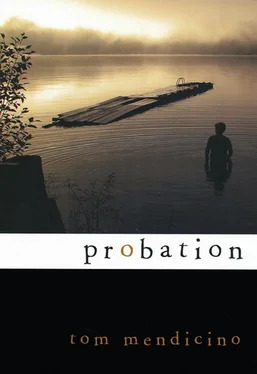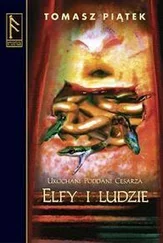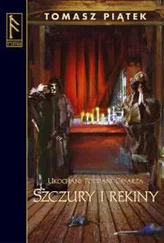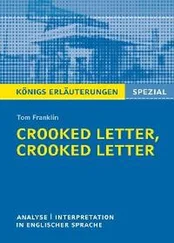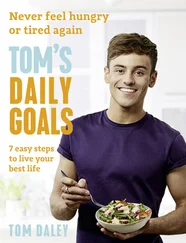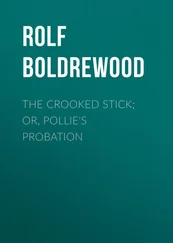I go upscale-what the hell, it’s only money-and check into a pricey “beach resort” with an ocean view. I flop on the bed, crack open a beer from the minibar, and scan the sports page of the local paper. Not a whole lot of news to report. The reigning MVP has arrived in camp five days early and twenty pounds lighter. The ace of the staff threw a bull-pen session this morning. I’ll be at the retail furnishings expo in California by the time the first pitch is thrown at home field in Clearwater. In the morning I’ll try to find that diner where the waitresses wear player jerseys and they call hot dogs Phillie Phrankfurters on the menu. There must be one happy memory that hasn’t been bulldozed and redeveloped.
At least I’ll be able to report back at Therapy Central I made the effort.
“All that boy wants is to be with you. Why can’t you give him that?”
My mother’s voice had a hard edge, bordering on confrontational. She was frustrated, angry, torn between divided loyalties, constantly running interference between the men in her life.
Didn’t you promise him you’d take him for ice cream?
Weren’t you going to let him help you paint the garage door?
I thought you said he could hold the ladder.
Would it hurt you to try to be enthusiastic when he wants to tell you something?
Can’t you try to be a little patient?
She hadn’t planned on spending my entire childhood playing umpire, but there she was once again, standing behind home plate, calling balls when my father’s sure he’s throwing strikes, awarding first base to her little boy.
“Why did you tell him you were going to take him to the movies if you were planning to play golf this afternoon?”
There was defeat and submission in my father’s footsteps as he climbed the stairs. I turned my face to the wall when he opened the door. The mattress sank under his weight and he sighed, not knowing what to say. He reached over and patted my hip.
“Come on, come on,” he said, his voice registering somewhere between irritation and resignation. “You’re getting too old to cry. Come on, come on,” he said, tugging gently at my shoulder. “I’m sorry. I’m really sorry.”
I knew this was more than a half-baked act of contrition to get my mother off his back. This was the real thing. His deep voice rumbled and he spoke softly. He didn’t say he was sorry often and he didn’t want anyone to hear him, not even me. I knew I could get away with anything at that moment, even throwing my arms around his neck without him pushing me away.
Then he bounced me on the mattress and told me to put on my shoes. It’s any movie I want to see. Just me and him. Gina’s not invited and this time my father, who always surrendered whenever his little girl sulked or threatened to turn on the tears, was resolute, knowing it was less dangerous to disappoint his daughter than to upset his wife. I knew the old man didn’t want to squirm through some stupid Disney cartoon and would agree to any horror movie I chose, the bloodier the better. My mother would lay into him good when I woke up screaming with nightmares. After the movie, we went for hamburgers and fries and I didn’t even care when he chewed with his mouth open. And, that night, I went to sleep happy, believing every day was going to be like today, only to be crushed and defeated when he ignored me at breakfast in the morning.
I don’t recall exactly when I began my guerilla campaign. My first acts of rebellion were benign enough, like leaving the new catcher’s mitt out in the rain, then “losing” its replacement two days later. He assumed it was just carelessness, not yet recognizing outright defiance, and he hollered until he was red in the face. My efforts to capture his attention never failed to provoke paternal eruptions that fueled my courage and pushed me a little closer to the edge of outrageousness until, finally, one sunny afternoon when any true son of my father would be fielding ground balls, I burst out of my bedroom, shaking and twitching to the Original Cast Recording of Hello, Dolly!
Threats were useless, the situation hopeless, the conclusion obvious.
SOMETHING MUST BE DONE!
My parents-rather, more accurately my mother with my father reluctantly in tow-packed themselves in the Chrysler and drove the three and three-quarter miles to the Throne of Solomon. Father Gillen, the parish priest, steeped a pot of tea for my mother and brought out the bottle for my father. The good padre must have sat there, hands folded around his glass, while my mother groped for words to describe “the predicament,” cautiously avoiding the obvious ones like “effeminate” and “sissified,” finally settling on “different.” They’d hoped I’d grow out of “it,” that it was just a “stage,” but I was almost ten years old and “the problem” wasn’t going away. My father wouldn’t have said more than ten words. Father Gillen had seen the world twice over through the bottom of his own whiskey glass and, clearing his throat, suggested the obvious solution.
And so it came to pass that arrangements were made with Harrison Park Elementary School to excuse one Andrew Nocera from five days of long division and the battles of the War Between the States. My father and I drove down the coast to spend an entire week, just the two of us, in Clearwater, Florida, spring training camp for the Philadelphia Phillies. He bought a pair of red baseball caps for the trip. His rested on his head like a crown; mine was too big and slid to my ears, the visor obstructing my line of vision.
God knows what that old priest expected to happen that week. I doubt that in his infinite wisdom he envisioned me propped on a bar stool until almost midnight, bribed with Coca-Colas and bags of potato chips, while my father relived Great Phillies Games of the Past, inning by inning, with assorted fanatics and hangers-on. During the day, we baked in the heat, my sunburn getting sunburned, staring at the field as my father read the tea leaves in the meaningless exhibition games that dragged on through the afternoon. My stomach revolted and I dropped my head and threw up the boiled hot dogs I had for lunch. The old man was flummoxed, staring helplessly as if he had never seen a sick child before, which, of course, he hadn’t, having delegated all nursing duties to my mother. A butcher’s wife from Allentown, Pennsylvania, took pity on me and wiped my mouth and cleaned my shoes.
At night, the old man snored and farted and woke up every two hours to piss. In the morning, I stared at the red puncture scars in his armpits while he dozed. I touched them gently, afraid of hurting him. The Army, he said, when I asked where he got them. Bullets? Shrapnel?
“No,” he snorted. “Goddamn doctors.”
He’d been a top prospect, signed by the Phillies out of high school in 1944 to a contract with a clause requiring him to report for assignment in the club’s farm system within thirty days of military discharge. My father’s war was played in innings. Assigned to Special Services, he attained the rank of center fielder and shipped out west, California first, then on to Hawaii. The marquee names of the Great American Pastime were serving their country playing ball for Uncle Sam; career minor-leaguers and promising young kids like my father filled any holes in the rosters. The homesick troops of the Pacific theater who packed Honolulu Stadium on R &R didn’t seem to resent comrades in arms whose greatest risk was being hit by a wild pitch. A mosquito bite ended my father’s baseball career. Stricken by malaria while touring the Philippines, he spent two years in a Veterans Administration hospital, his recovery, uncertain at first, complicated by juvenile diabetes.
“Wasn’t meant to be. No use crying over spilt milk,” he groused as he sat spread-eagled on the motel bed, injecting insulin in his thigh. Then he doctored his coffee with four packets of sugar and we split a half dozen doughnuts for breakfast before heading out for another afternoon under the blazing sun.
Читать дальше
